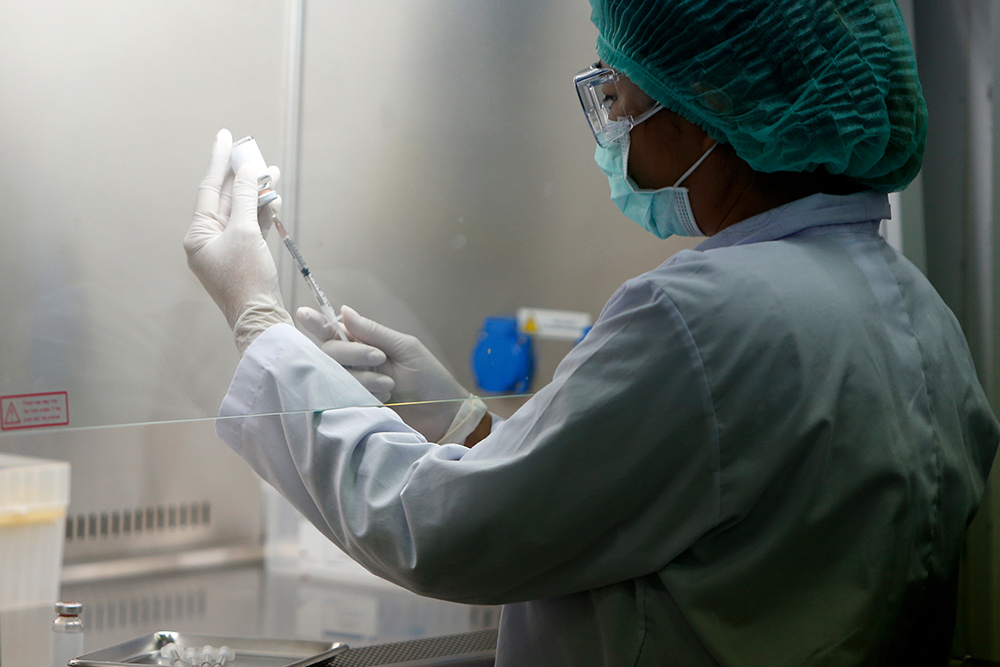
首批疫苗将获得临床批准并投放市场。制药业将会尽其所能研制疫苗,因此我们有充分的理由期待,这项前所未有的研究工作会取得成功。然而,我们并不想让制药公司做他们通常会做的一件事,那就是决定让谁优先接种疫苗。
虽然我们听说过制药公司为了研制新冠疫苗而暂停了研制其他疫苗的工作,但是我们从瑞德西韦(Remdesivir)这一药品的研制和定价来看,医药公司依旧会生意兴隆。第一位SARS-CoV-2疫苗接种者,会不会是拥有最多信用卡或最具影响力的人?还是属于那些极易感染的人群或处于高风险环境下的一线工作者?
基于这些问题的考虑,医药公司在定量配给这种潜在的冠状病毒疫苗时应考虑以下几个因素。
第一个考虑因素是,制药公司应该依靠谁来做出疫苗配给的决定。如果制药公司的领导人知道世界上只能得到1亿剂疫苗,那么最好的对策就是能够有效地管理他们的资源。要根除疫情就要从源头上控制疫情,在这种情况下,制药公司的领导人可能会将这一决定委托给世界卫生组织(WHO)这种类型的机构,授权他们可以在必要时进行干预。
但这样的策略可能会在全球和地方政治中遭遇挑战。在美国,已经有三个组织——美国国家医学院(National Academy of Medicine,非营利性质机构)、为美国疾病控制与预防中心(the Centers for Disease Control and Prevention)工作并提供政策建议的美国免疫实施咨询委员会(the Advisory Committee on Immunization Practices),和致力于快速研制新型冠状病毒疫苗的政府计划“空间战机行动”(Operation Warp Speed),在美国应该如何决定谁先接种疫苗的问题上存在分歧。面对这样尴尬的状况和与世卫组织的对立,生产出第一批1亿剂疫苗的公司将会面临一个独特的挑战,即到底该听谁的。
其二,公司必须考虑谁可以安全地接种疫苗。由于潜在的风险,第一批疫苗的最初应用可能会局限于那些极易感染的人群。之前就出现过,即使在疫苗被批准广泛使用之后,仍然会出现许多未知的状况。仓促做出的决定可能导致安全问题,这可能损害社会对疫苗的普遍信任,尤其是对于此次疫情的全球化响应。
第三个伦理考虑是如何在各国之间分配疫苗。这个决定不能基于支付意愿或支付能力的传统参数。即使我们假设各国政府的行动意图是好的,但在先到先得的基础上分配剂量或对疫苗定价以限制各国需求,也会在全球范围内造成分配方式的不平等。
COVAXX是美国联合生物医学公司(United Biomedical)的一个部门,目前正在研制一种COVID-19疫苗并提供抗体测试,现已建立了一个独立的、掌握特权的小组,为第一批1亿剂疫苗的交易设定标准(我的公司IDEA Pharma是COVAXX的顾问)。如果公司不能依靠政府或国际组织的帮助——正如新冠疫苗的情况一样,他们必须建立自己的指导方针。
这种小组必须满足一些要求:它必须有足够的多样化的观点。专家组的决定不应基于民族或种族,但也不能忽视这些因素对疫苗需求的影响;该组织不应一意孤行地只关注道德问题;该决定应该平衡经济、人类学、病毒学、流行病学、公共卫生和政治因素。
在美国关于奥巴马医改计划(Obamacare)的辩论中,我们看到了“死亡小组”一词的出现,因此我们知道关于医疗配给的讨论是多么具有争议和令人不适。但我们必须定量配给。最终,第一批1亿剂将会守护70亿人的生命。但总有人会成为“一号接种者”。
我们希望其他药品制造商都能设立类似的委员会。制药公司的声誉也许可以通过我们目前所见的其快速发展而得以挽救,或通过“生命小组”的缓慢而又慎重的思考而得以挽救。(财富中文网)
迈克·雷亚是IDEA Pharma公司首席执行官。
编译:刘心辰
首批疫苗将获得临床批准并投放市场。制药业将会尽其所能研制疫苗,因此我们有充分的理由期待,这项前所未有的研究工作会取得成功。然而,我们并不想让制药公司做他们通常会做的一件事,那就是决定让谁优先接种疫苗。
虽然我们听说过制药公司为了研制新冠疫苗而暂停了研制其他疫苗的工作,但是我们从瑞德西韦(Remdesivir)这一药品的研制和定价来看,医药公司依旧会生意兴隆。第一位SARS-CoV-2疫苗接种者,会不会是拥有最多信用卡或最具影响力的人?还是属于那些极易感染的人群或处于高风险环境下的一线工作者?
基于这些问题的考虑,医药公司在定量配给这种潜在的冠状病毒疫苗时应考虑以下几个因素。
第一个考虑因素是,制药公司应该依靠谁来做出疫苗配给的决定。如果制药公司的领导人知道世界上只能得到1亿剂疫苗,那么最好的对策就是能够有效地管理他们的资源。要根除疫情就要从源头上控制疫情,在这种情况下,制药公司的领导人可能会将这一决定委托给世界卫生组织(WHO)这种类型的机构,授权他们可以在必要时进行干预。
但这样的策略可能会在全球和地方政治中遭遇挑战。在美国,已经有三个组织——美国国家医学院(National Academy of Medicine,非营利性质机构)、为美国疾病控制与预防中心(the Centers for Disease Control and Prevention)工作并提供政策建议的美国免疫实施咨询委员会(the Advisory Committee on Immunization Practices),和致力于快速研制新型冠状病毒疫苗的政府计划“空间战机行动”(Operation Warp Speed),在美国应该如何决定谁先接种疫苗的问题上存在分歧。面对这样尴尬的状况和与世卫组织的对立,生产出第一批1亿剂疫苗的公司将会面临一个独特的挑战,即到底该听谁的。
其二,公司必须考虑谁可以安全地接种疫苗。由于潜在的风险,第一批疫苗的最初应用可能会局限于那些极易感染的人群。之前就出现过,即使在疫苗被批准广泛使用之后,仍然会出现许多未知的状况。仓促做出的决定可能导致安全问题,这可能损害社会对疫苗的普遍信任,尤其是对于此次疫情的全球化响应。
第三个伦理考虑是如何在各国之间分配疫苗。这个决定不能基于支付意愿或支付能力的传统参数。即使我们假设各国政府的行动意图是好的,但在先到先得的基础上分配剂量或对疫苗定价以限制各国需求,也会在全球范围内造成分配方式的不平等。
COVAXX是美国联合生物医学公司(United Biomedical)的一个部门,目前正在研制一种COVID-19疫苗并提供抗体测试,现已建立了一个独立的、掌握特权的小组,为第一批1亿剂疫苗的交易设定标准(我的公司IDEA Pharma是COVAXX的顾问)。如果公司不能依靠政府或国际组织的帮助——正如新冠疫苗的情况一样,他们必须建立自己的指导方针。
这种小组必须满足一些要求:它必须有足够的多样化的观点。专家组的决定不应基于民族或种族,但也不能忽视这些因素对疫苗需求的影响;该组织不应一意孤行地只关注道德问题;该决定应该平衡经济、人类学、病毒学、流行病学、公共卫生和政治因素。
在美国关于奥巴马医改计划(Obamacare)的辩论中,我们看到了“死亡小组”一词的出现,因此我们知道关于医疗配给的讨论是多么具有争议和令人不适。但我们必须定量配给。最终,第一批1亿剂将会守护70亿人的生命。但总有人会成为“一号接种者”。
我们希望其他药品制造商都能设立类似的委员会。制药公司的声誉也许可以通过我们目前所见的其快速发展而得以挽救,或通过“生命小组”的缓慢而又慎重的思考而得以挽救。(财富中文网)
迈克·雷亚是IDEA Pharma公司首席执行官。
编译:刘心辰
There will be a first vaccine approved. There will be a first vaccine made available commercially. The pharmaceutical industry will do its thing, and we have good reason to expect success from an unprecedented research effort. However, there is a place where we don’t want pharma to do what it usually does, and that is to decide who gets that first vaccine.
While we’ve heard that pharma’s normal behavior has been suspended in pursuit of a vaccine for COVID-19, we have already seen rumblings of business as usual in the procurement and pricing of remdesivir. Should the first person to be vaccinated for SARS-CoV-2 be the one with the most exclusive credit card, or the most influential government? Should they be among the most vulnerable or the most critical frontline workers?
With these questions in mind, companies should take the following considerations into account for the rationing of a potential coronavirus vaccine.
The first consideration is over who pharma companies should rely on to make decisions about vaccine rationing. If pharma leaders knew the world would only ever get 100 million doses of vaccine, the best response would be to efficiently manage their resources. Eradication would be about management of outbreaks at their source, in which case pharma leaders might decide to delegate that decision to a World Health Organization (WHO)-type body, with a remit to intervene where necessary.
But such a strategy would run into challenges in global and local politics. Already, in the U.S., three groups—the National Academy of Medicine, a nonprofit; the Advisory Committee on Immunization Practices, which works within and advises policy for the Centers for Disease Control and Prevention; and Operation Warp Speed, a government program dedicated to fast-tracking coronavirus vaccine development—have disagreed about how the U.S. should decide who gets a vaccine first. In the face of such confusion, and antagonism to the WHO, the company making those first 100 million doses will face a unique challenge in deciding who to follow.
Second, companies must consider who can safely be given the vaccine. Because of potential risks, the first vaccine’s initial application may be limited with vulnerable populations. We’ve seen before that there are many unknowns about a vaccine even after it is approved for widespread use. Decisions taken in haste can lead to safety issues, which could damage society’s belief in vaccines in general, and the global response to this pandemic specifically.
The third ethical consideration is how to distribute the vaccine among countries. The decision cannot be based on traditional parameters of willingness or ability to pay. Even if we assume that governments are acting with the best of intentions, allocating doses on a first-come, first-served basis or pricing the vaccine to limit demand will create inequality in how it’s allocated worldwide.
COVAXX, a division of United Biomedical that is developing a COVID-19 vaccine and offers an antibody test, has created an independent prioritization panel to set criteria for any deals done for the first 100 million vaccine doses. (My company, IDEA Pharma, is advising COVAXX.) If companies cannot rely on help from governments or international organizations—as is clearly the case with COVID-19—they must instead establish their own guidelines.
Such a panel must meet a few requirements. It should have adequate diversity of opinion. The panel should not base its decisions on ethnicity or race—but it also cannot ignore the influence those factors will have on demand. The group should not have a singleminded focus on ethics; that should be balanced with economic, anthropological, virological, epidemiological, public health, and political considerations.
During the debate over Obamacare in the U.S., we saw the emergence of the term “death panels,” so we know how controversial and uncomfortable discussions over the rationing of care can be. But ration we must. Eventually, the first 100 million doses will lead to 7 billion protected lives. But someone will be patient No. 1.
We should hope that all other manufacturers adopt similar committees. Pharma’s reputation may be saved by the warp-speed development we’re currently seeing, but also perhaps by the slow, intentional reflection of a “life panel.”
Mike Rea is CEO of IDEA Pharma.






